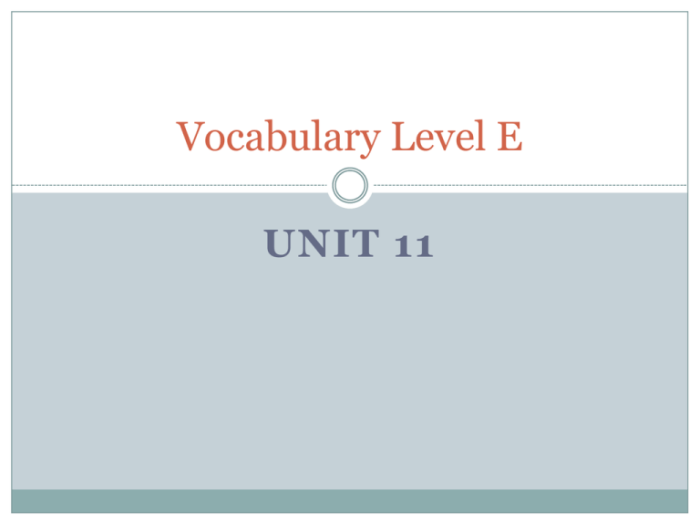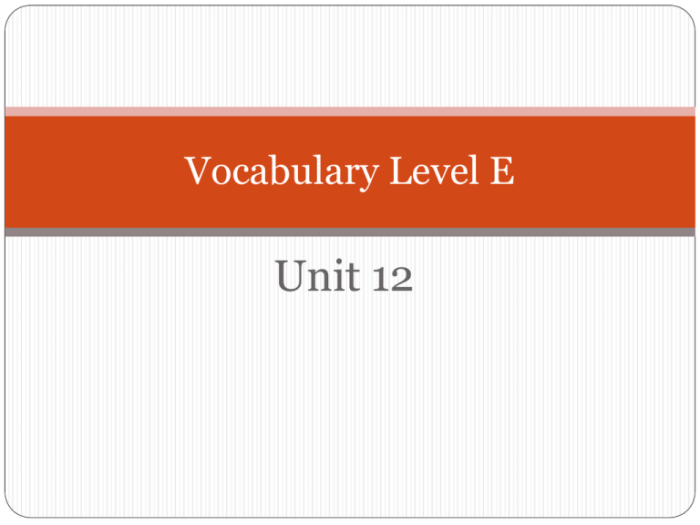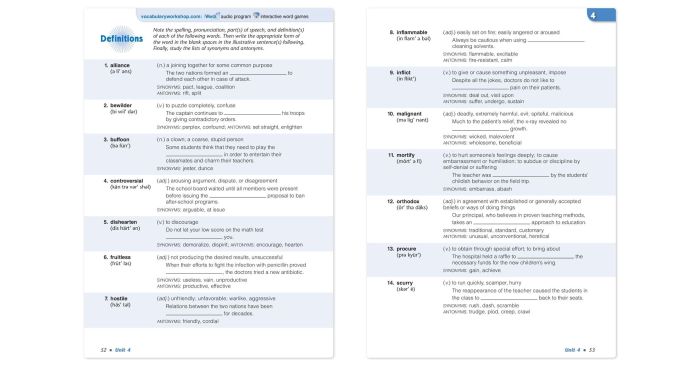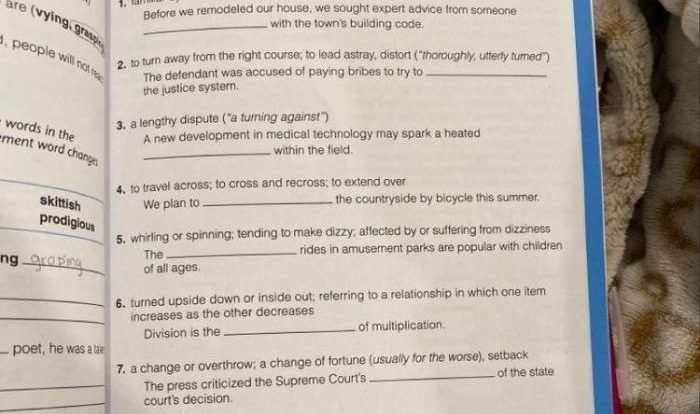Embark on a linguistic adventure with Vocabulary Level E Unit 4, where words ignite understanding and unlock the power of communication. This comprehensive guide delves into the heart of vocabulary acquisition, empowering you with strategies, assessments, and activities that will elevate your language skills to new heights.
As we delve into the intricacies of vocabulary, you’ll discover the building blocks of language, expanding your comprehension and expression. From core concepts to effective memorization techniques, this exploration will equip you with the tools to master vocabulary and unlock a world of possibilities.
Vocabulary Level E Unit 4
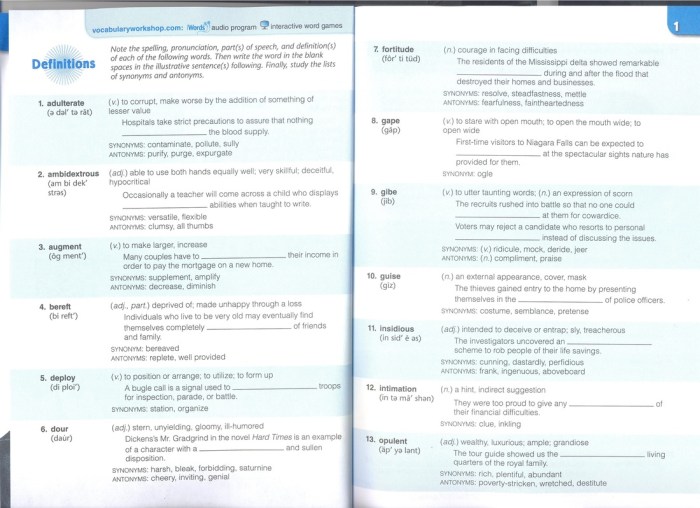
Welcome to Vocabulary Level E Unit 4! In this unit, we’ll focus on expanding your vocabulary in the areas of emotions, physical sensations, and social interactions. By the end of this unit, you’ll be able to understand and use a wider range of vocabulary related to these topics, which will help you communicate more effectively in various situations.
Building a strong vocabulary foundation is essential for effective communication. It allows you to express yourself clearly and precisely, and to understand the nuances of what others are saying. A rich vocabulary also makes reading and writing more enjoyable and rewarding.
Vocabulary Level E Unit 4 has a wide range of challenging vocabulary words, including some that can be difficult to remember. To improve your recall, you can practice using these words in different contexts. One helpful resource is the d kefs trail making test , which can help you improve your visual scanning and attention skills.
By incorporating these strategies into your vocabulary learning, you can significantly enhance your ability to remember and use new words effectively in Vocabulary Level E Unit 4.
Emotions
Emotions are a fundamental part of human experience. In this unit, we’ll explore a variety of emotions, from the most basic to the most complex. We’ll learn how to identify and express our own emotions, as well as how to understand and respond to the emotions of others.
- Basic emotions: joy, sadness, anger, fear, surprise, disgust
- Complex emotions: love, hate, guilt, shame, pride
- Emotional states: happiness, sadness, anger, fear, anxiety, depression
Physical Sensations, Vocabulary level e unit 4
Physical sensations are the way we experience the world around us through our senses. In this unit, we’ll explore a variety of physical sensations, from the most basic to the most complex. We’ll learn how to identify and describe our own physical sensations, as well as how to understand and respond to the physical sensations of others.
- Basic sensations: touch, taste, smell, sight, hearing
- Complex sensations: pain, pleasure, hunger, thirst, fatigue
- Physical states: healthy, sick, tired, hungry, thirsty
Social Interactions
Social interactions are a vital part of human life. In this unit, we’ll explore a variety of social interactions, from the most basic to the most complex. We’ll learn how to initiate and maintain conversations, how to build relationships, and how to resolve conflicts.
- Basic social interactions: greetings, introductions, small talk
- Complex social interactions: conversations, debates, negotiations
- Social skills: communication, listening, empathy, conflict resolution
Strategies for Vocabulary Development
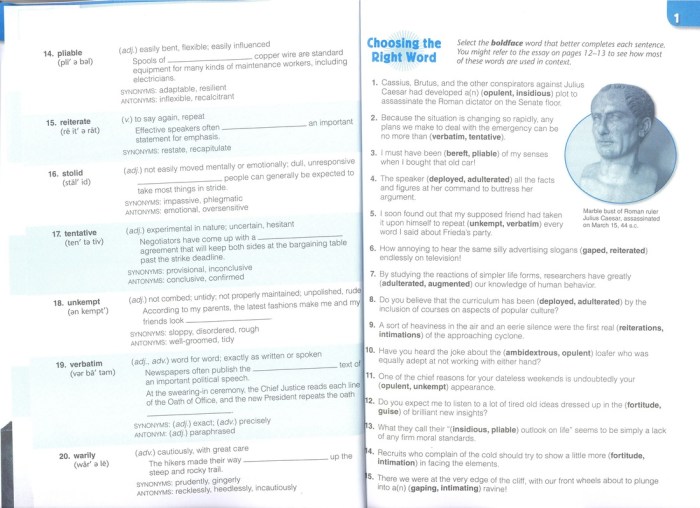
Vocabulary development is essential for effective communication and academic success. Expanding one’s vocabulary requires deliberate strategies and consistent practice. This unit explores proven techniques for enhancing vocabulary and the crucial role of reading, writing, and speaking in language acquisition.
Role of Reading, Writing, and Speaking in Vocabulary Acquisition
Reading exposes individuals to diverse language structures and vocabulary. It allows them to encounter words in context and learn their usage and meaning. Writing encourages active recall and application of vocabulary, reinforcing understanding and retention. Speaking provides opportunities to practice using new words and receive feedback on pronunciation and usage.
Tips for Memorizing and Retaining New Words
Effective memorization involves repetition, association, and active engagement. Here are some practical tips:
- Review regularly:Repeated exposure to new words strengthens memory.
- Use flashcards:Create flashcards with the word on one side and its definition or example on the other.
- Associate with existing knowledge:Connect new words to familiar concepts or experiences.
- Use new words in context:Practice using new words in sentences or conversations.
- Engage in word games:Crosswords, puzzles, and other word games provide fun and interactive ways to learn.
Assessment and Evaluation: Vocabulary Level E Unit 4
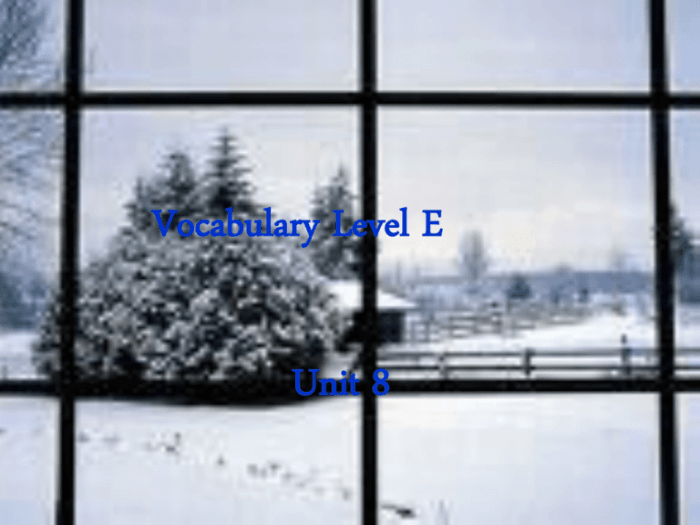
Assessing students’ vocabulary level is crucial for effective teaching. It helps teachers gauge students’ understanding, identify areas for improvement, and tailor instruction accordingly.
Ongoing assessment is essential to monitor students’ progress and provide timely feedback. Informal assessments, such as quick quizzes or class discussions, can be used to check comprehension and identify misconceptions.
Formative Assessments
- Regular quizzes and exercises
- Classroom discussions and participation
- Word games and puzzles
These assessments provide immediate feedback and allow teachers to adjust instruction based on students’ needs.
Summative Assessments
- Vocabulary tests (e.g., multiple choice, fill-in-the-blank)
- Essays or writing assignments that require students to use new vocabulary
- Presentations or projects that demonstrate students’ understanding of vocabulary
Summative assessments evaluate students’ overall progress and mastery of vocabulary.
Lesson Planning and Activities
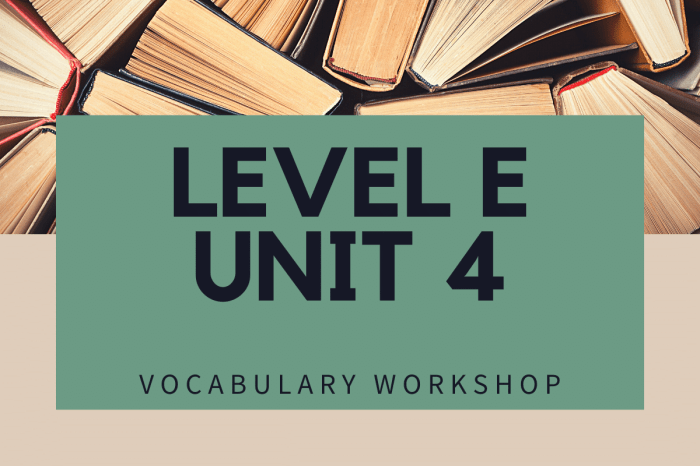
Lesson planning is crucial for effective vocabulary instruction. It provides a roadmap for teachers to ensure comprehensive coverage of vocabulary concepts while engaging students in meaningful learning experiences.
When planning vocabulary lessons, consider the following:
- Objectives:Clearly define the specific vocabulary skills and concepts students will acquire.
- Materials:Gather resources such as texts, videos, and manipulatives to support vocabulary development.
- Instructional Strategies:Employ a variety of strategies to introduce, reinforce, and assess vocabulary, such as direct instruction, interactive games, and technology-based activities.
- Assessment:Plan formative and summative assessments to monitor student progress and inform future instruction.
Engaging and Interactive Activities
Interactive activities enhance vocabulary retention and make learning enjoyable. Here are some engaging ideas:
- Word Walls:Create a visual display of vocabulary words with their definitions and examples.
- Vocabulary Charades:Have students act out vocabulary words while their classmates guess.
- Word Scavenger Hunts:Hide vocabulary words around the classroom and have students search for them.
- Online Vocabulary Games:Utilize educational websites and apps that offer interactive vocabulary games.
Incorporating Vocabulary Development into Different Subject Areas
Vocabulary development is not limited to English language arts. It can be integrated into various subject areas to enhance students’ overall academic success.
| Subject Area | Vocabulary Focus | Activities |
|---|---|---|
| Science | Scientific terminology, concepts | Science journals, science-related texts, hands-on experiments |
| Math | Mathematical vocabulary, problem-solving terms | Math games, word problems, manipulatives |
| Social Studies | Historical terms, geographical concepts | Historical texts, maps, primary source analysis |
FAQ Corner
What are the key concepts covered in Vocabulary Level E Unit 4?
Unit 4 focuses on building a strong vocabulary foundation, introducing core concepts such as synonyms, antonyms, homophones, and word roots.
How can I effectively expand my vocabulary?
Engage in active reading, writing, and speaking exercises. Utilize flashcards, practice root word analysis, and seek opportunities to use new words in context.
What is the importance of ongoing vocabulary assessment?
Regular assessments provide valuable feedback, allowing you to track your progress, identify areas for improvement, and adjust your learning strategies accordingly.
